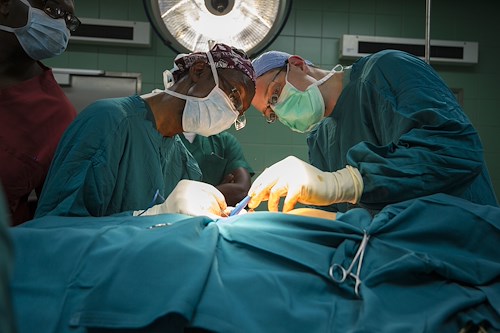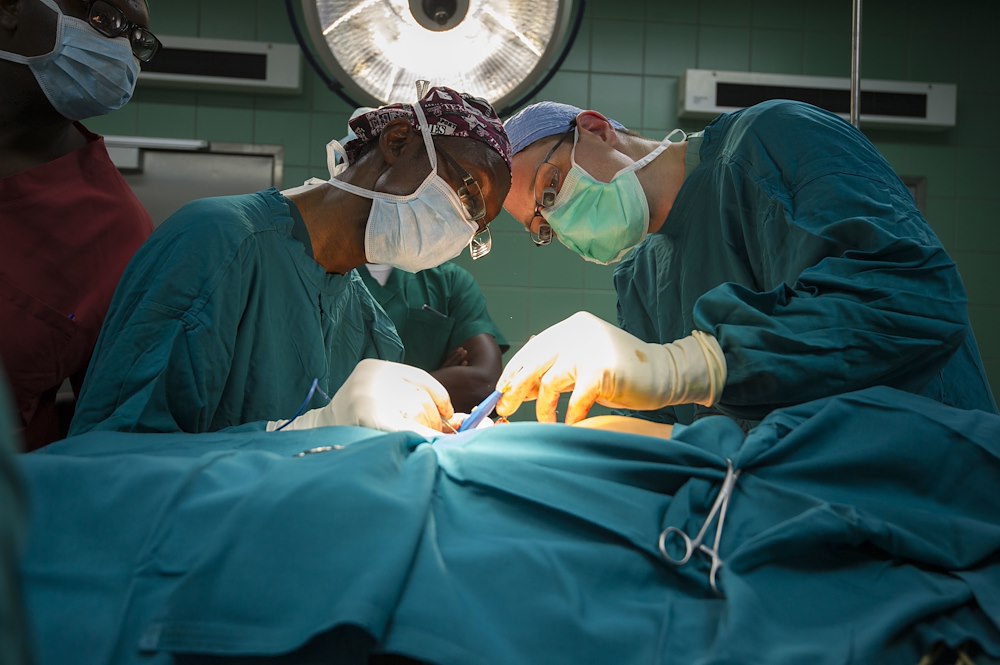Gallery contains 3 images
×
Photo 1 of 3
Americans learn innovation, gain confidence in medical skills through MEDRETE
U.S. Army Lt. Col. Neil McMullin, a plastic surgeon assigned to Brooke Army Medical Center, assists his Ghanaian counterpart perform a contracture release surgery during Medical Readiness Training Exercise 17-2 at the 37th Military Hospital in Accra, Ghana, Feb. 22, 2017. MEDRETE 17-2 includes participants from the Ghanaian government, U.S. Army Africa, Brooke Army Medical Center and the North Dakota National Guard. It is the second in a series of medical readiness training exercises that USARAF is scheduled to facilitate in various countries in Africa. The mutually beneficial exercise offers opportunities for the partnered militaries to cooperate on medical specific tasks, share best practices and improve medical treatment processes. (U.S. Army Africa photo by Staff Sgt. Shejal Pulivarti)
Photo by: Staff Sgt. Shejal Pulivarti
Photo 2 of 3
Americans learn innovation, gain confidence in medical skills through MEDRETE
U.S. Army Sgt. Michael Harvey, an operating room specialist assigned to Brooke Army Medical Center in San Antonio, Texas, prepares surgical tools for an operation during Medical Readiness Training Exercise 17-2 at the 37th Military Hospital in Accra, Ghana, Feb. 9, 2017. MEDRETE 17-2 includes participants from the Ghanaian government, U.S. Army Africa, Brooke Army Medical Center and the North Dakota National Guard. It is the second in a series of medical readiness training exercises USARAF is scheduled to facilitate in various countries on the African continent this year. The mutually beneficial exercise offers opportunities for the partnered militaries to cooperate on medical specific tasks, share best practices and improve medical treatment processes. (U.S. Army Africa photo by Staff Sgt. Shejal Pulivarti)
Photo by: Staff Sgt. Shejal Pulivarti
Photo 3 of 3
Americans learn innovation, gain confidence in medical skills through MEDRETE
North Dakota Army National Guard Capt. Annie Gerhardt, a nurse practitioner, prepares a complex laceration for surgical intervention during the Medical Readiness Training Exercise 17-2 in Ghana, Feb. 7, 2017. MEDRETE is a combined effort between the Ghanaian government, U.S. Army Africa, Brooke Army Medical Center in San Antonio, Texas, and the North Dakota National Guard. MEDRETE 17-2 is the second in a series of Medical Readiness Training Exercises that U.S. Army Africa is scheduled to facilitate within various countries in Africa. The mutually beneficial exercise offers opportunities for the partnered militaries to cooperate on medical specific tasks, share best practices and improve medical treatment processes. (U.S. Army Africa photo by Staff Sgt. Shejal Pulivarti)
Photo by: Staff Sgt. Shejal Pulivarti
ACCRA, Ghana – Fifteen American Soldiers traveled more than 10,000 miles from the U.S. to Ghana to conduct U.S. Army Africa’s Medical Readiness Training Exercise Feb. 5-24.
The MEDRETE team included twelve active duty Soldiers from Brooke Army Medical Center in San Antonio, Texas and three North Dakota Army National Guard Soldiers assigned to the state medical detachment in Bismarck. Comprised of officers and noncommissioned officers across various medical concentrations, the team worked alongside medical personnel from the Ghanaian Armed Forces at the 37th Military Hospital. In the 72 hours spent at the hospital during the three weeks, the team conducted 86 surgeries and treated more than 330 patients with their Ghanaian counterparts.
After landing in Ghana, the Americans broke off into smaller groups concentrating on two major parts of the facility: The Emergency Room (ER) and the Operating Room (OR). Four medics, one nurse, and one nurse practitioner were assigned to the ER, with the remaining seven which included operating room technicians, an anesthesiologist and several surgeons working in the OR.
“We are actually working in a team environment. So we are here working with the National Guard as well as with active Army in a seamless environment and partnering with medical professionals in Ghana,” said Capt. Annie Gerhardt, nurse practitioner for the North Dakota National Guard, who worked primarily in the emergency room.
The combined team worked alongside their Ghanaian counterparts for the duration of the MEDRETE. The exercise challenged the team to apply their medical processes and treatment capabilities in a safe but resource-limited environment.
“[Ghanaians] are in the lead and our presence here is to learn their system and work within the confines of their equipment and resources,” said Maj. Frank Agyapong, emergency room nurse assigned to BAMC. “We have a plethora of resources and diagnostic tools in the United States, so coming here is a little different. You have to rely on your fundamental assessment skills instead of diagnostics for everything. Hone in on your assessment skills and then use diagnostics to enhance your clinical assessment.”
The team learned early in the first week to go back to the basics and sharpen their foundational techniques.
“I’ve learned that it’s hard to use a stethoscope in the ER because of all the noise, so I’ve learned other ways to examine a patient by watching my counterparts,” said Gerhardt. “The Ghanaian doctors are extremely good at clinical exams and working around their restrictions but not compromising the level of care provided to their patients.”
During a review in the first week, the team noted all the techniques used by their counterparts are universal. They just had more options to get to the same end-result in the U.S.
“Even though the machines are very similar, they don’t have quite the same tools. It makes you rely more on basic assessment skills. What we tend to not do so well in the U.S. sometimes—monitor the patient versus monitoring the machine,” said Maj. Keith Lathrop.
The Ghanaian medical processing sometimes has a delay to reach the medical care provider. “Delayed care… would be similar when we are in an actual military conflict. You might have to triage and learn how to prioritize providing care,” said Gerhardt. “There is a lot of thinking on your feet—just like if we were deployed.”
The American medical team members used this exercise to increase confidence in their skills.
“I’ve been able to do things here, practice my basic medic skills, that I haven’t had the opportunity to do in my career yet,” said Sgt. 1st Class Eric Anton, medic for the North Dakota National Guard. Anton, who is currently in an operational position in Bismarck, became a medic within the last two years. “Although I’m senior in rank, I’m junior in the field, so this has been really beneficial to me and has given me more experience.”
“Being competent and capable is necessary but you also have to be confident in your competence. This exercise will give you that confidence,” said Maj. John Ritchie, a general surgeon assigned to BAMC.
Following MEDRETE 17-2, U.S. Army Africa will conduct three more MEDRETEs this year in Chad, Gabon and Cameroon.














